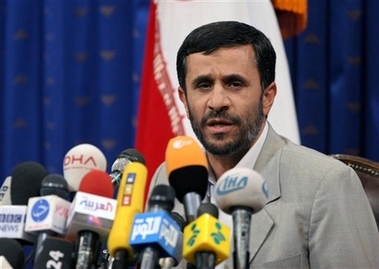Defiant Iran faces sanctions risk
(Reuters)Updated: 2006-09-01 08:26
UNITED NATIONS - Tehran has failed to dispel international doubts it wants nuclear bombs, the U.N. nuclear watchdog agency reported on Thursday, clearing the way for the Security Council to consider sanctions on Tehran.
But council diplomats said they would proceed cautiously, delaying deliberations until after a meeting between European Union foreign policy chief Javier Solana and top Iranian nuclear negotiator Ali Larijani.
 President Mahmoud Ahmadinejad speaks during a press conference in Tehran, Iran, Tuesday, Aug. 29, 2006. Iran's hard-line president on Tuesday challenged the authority of the U.N. Security Council, saying no one can prevent his country from having a peaceful nuclear program. [AP] |
After that, John Bolton, the U.S. ambassador to the United Nations, said he would meet with his French, British and German counterparts to begin talks on a sanctions resolution.
"We are certainly ready to proceed here in New York once we are given the instruction to do so," Bolton told reporters.
Western countries, including the United States and the European Union fear Tehran is using a civilian nuclear energy program as a cover for making atomic bombs. Iran says it wants only to generate electricity.
The Security Council and the Vienna-based International Atomic Energy Agency, or IAEA, had demanded that Iran suspend its enrichment of nuclear material by the end of August -- needed to make fuel for both bombs and nuclear power plants -- so that talks could begin on a way to resolve the crisis.
But an IAEA report said Iran just last week resumed making low-enriched uranium, suitable for power plant fuel, with a cascade of 164 centrifuges at its pilot enrichment plant.
It also said a lack of Iranian cooperation had crippled three-year-old IAEA probes into the program.
"Iran has not suspended its enrichment related activities," the IAEA said. "Iran has not addressed the long outstanding verification issues or provided the necessary transparency to remove uncertainties associated with some of its activities."
SECURITY COUNCIL HESITATIONS?
Despite the findings, some members of the 15-nation Security Council showed hesitation.
"I do hope that even after the passing of the deadline, we should talk to each other to find a way out," Chinese U.N. Ambassador Wang Guangya said.
French Foreign Minister Philippe Douste-Blazy, while deploring Tehran's "unsatisfactory response" to the proposal for negotiations, said he remained convinced that "priority must still be given to the path of dialogue."
Solana said he had "a good conversation" with Larijani and was trying to arrange a meeting soon to clarify a proposal from Tehran that future talks center on the scope of its program.
An EU diplomat said Solana tentatively planned to meet Larijani in Berlin on Tuesday.
President Bush said Iran must pay a price.
"We will continue to work closely with our allies to find a diplomatic solution, but there must be consequences for Iran's defiance. We must not allow Iran to develop a nuclear weapon," he told a convention of U.S. veterans.
Washington said senior officials of the six world powers handling Iran's case at the Security Council -- Britain, China, France, Germany and Russia as well as the United States -- would meet in Berlin next Wednesday to mull strategy.
Iran shrugged off the threat of punishment, saying the IAEA showed U.S. accusations about its plans were wrong.
"Generally, although this report has not fully satisfied us, it shows that America's propaganda and politically motivated claims over (our) program are baseless and based on American officials' hallucinations," Mohammad Saeedi, the deputy head of the Iranian Atomic Energy Organization, told the official news agency IRNA.
But Bolton said the IAEA report showed Iran's nuclear pursuits could only be explained by military ambitions.
"The report, short and to the point, concludes that after all these years of trying, the IAEA is still unable to confirm the peaceful nature of Iran's nuclear program," he said.
U.S. analyst David Albright said Iran's nuclear progress was slower than expected and its plan to start installing 3,000 centrifuges later this year in a vast underground chamber being built at Natanz looked unrealistic.
U.S. officials acknowledged Iran may be encountering technical difficulties but said this did not diminish the fact that it had nuclear ambitions and was acting on them.
Western diplomats say they want the U.N. sanctions to be imposed on Iran in an incremental fashion, increasing the pressure over time if Iran presses on with its nuclear programs.
Bolton told CNN that Washington did not yet have a firm idea of which sanctions should be imposed first, beyond a preference for measures targeting Iran's leaders and its nuclear and ballistic missile capabilities.
"We don't have a quarrel with the Iranian people. We have
a quarrel with the government and their pursuit of nuclear weapons and that is what we are going to try and target."
At the same time, Bolton said he hoped like-minded governments such as Japan and European Union nations could work outside the United Nations to clamp down on financial transactions and investments in Iran.
|
||
|
||
|
|